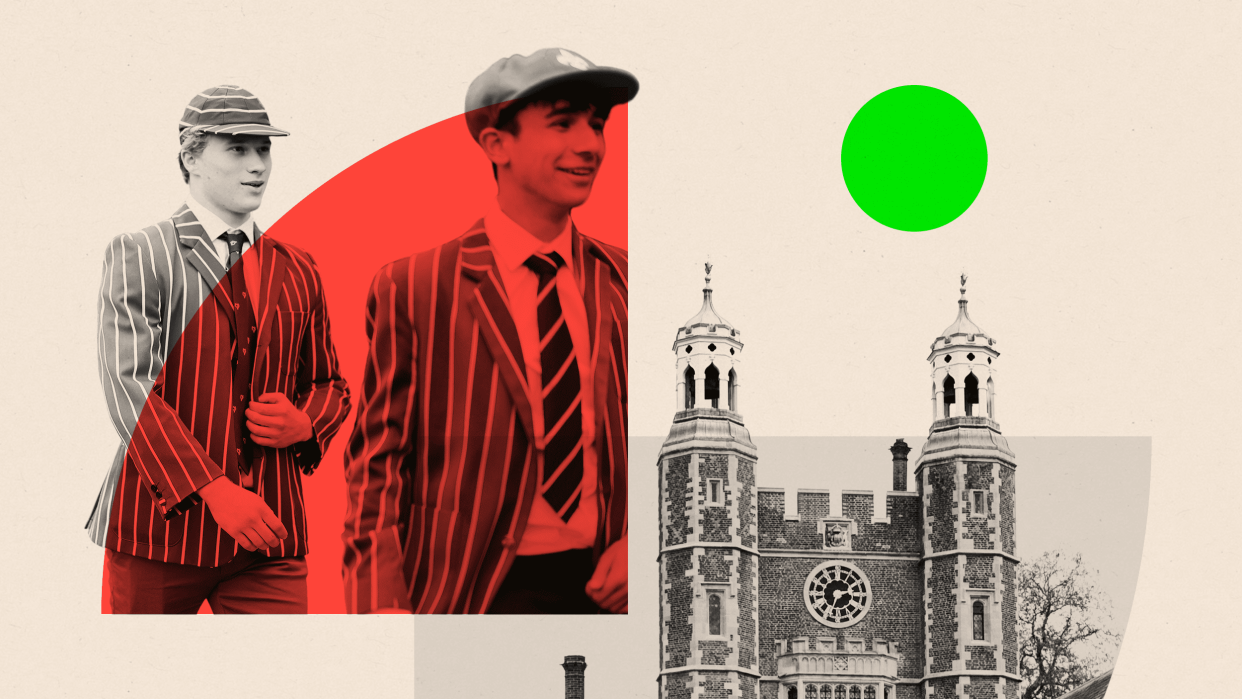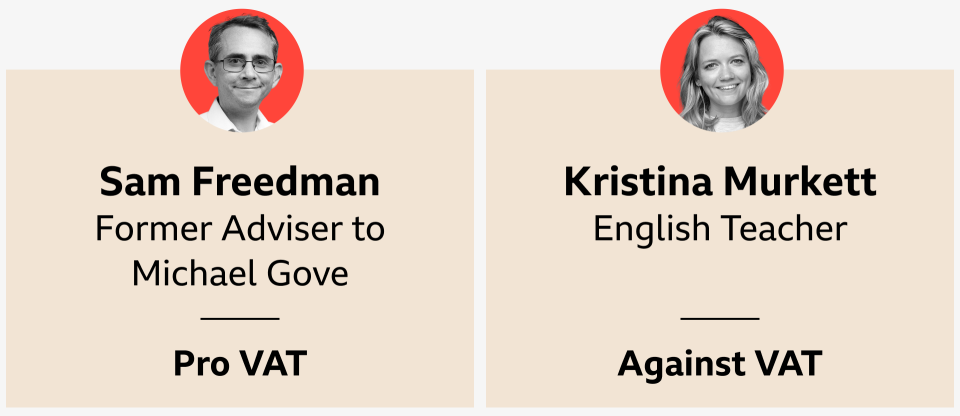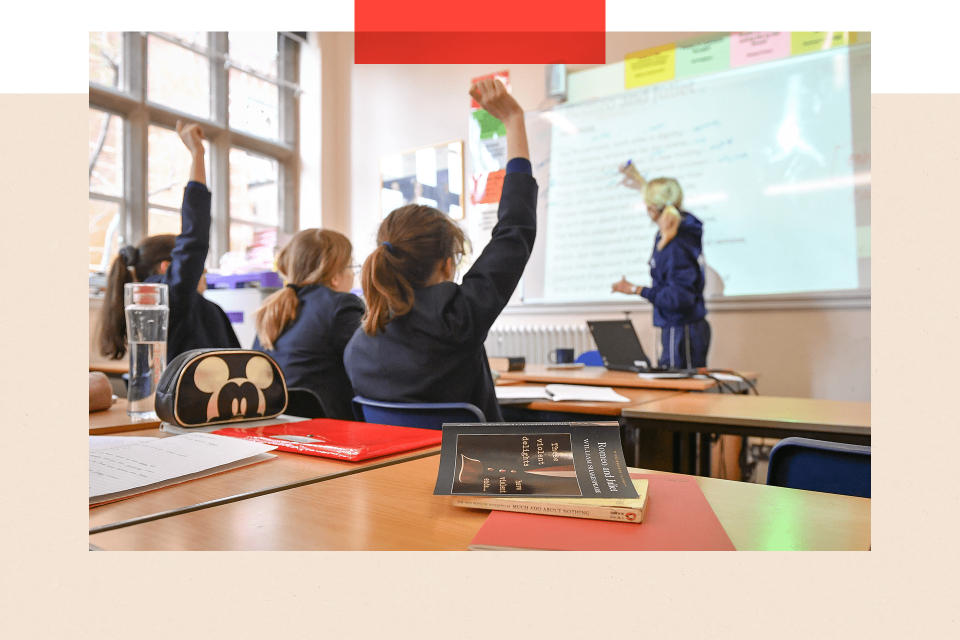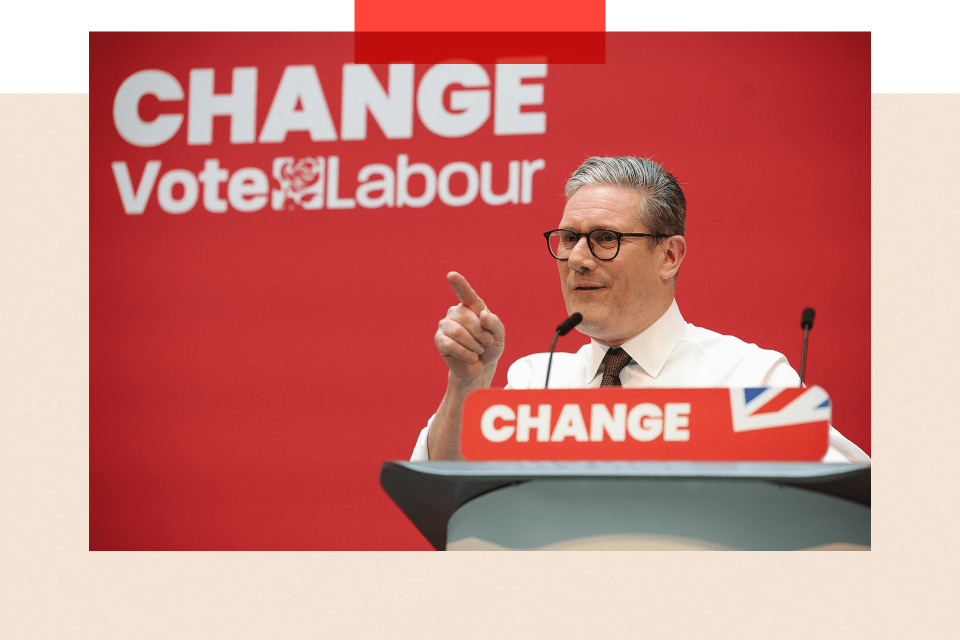Would Labour’s private school tax plan work?

The Labour Party has pledged to add tax to private schools fees and use the funds to recruit teachers for state schools.
The policy, proposed in Labour’s manifesto, has split opinion. Some argue it is a reasonable way to raise revenue and others think it’s an unfair charge that will fall on parents.
The BBC’s Sarah Montague spoke with Sam Freedman, former adviser to the former Education Secretary Michael Gove, who is in favour of the proposed VAT charge, and Kristina Murkett, an English teacher at a private school, who is against.
Their conversation was first broadcast on Monday 17 June on BBC Radio 4’s World At One.
Meet The Participants


One of the Labour Party’s few clear money raising policies in their manifesto is to impose VAT on private school fees. They reckon they can raise £1.5 billion to train 6,500 more teachers.
It’s a policy that polls well. Perhaps not surprising given that only around 7% of all students go to private school. Although that figure rises to 17% of all sixth formers, according to University College London.
Given Labour’s huge lead in the polls it could mean 20% added to school fees. So what would the consequences of that be?

My fear is that this is not the sort of easy win for social mobility that Labour are kind of portraying it to be, and there's a couple of reasons for that.
I mean, lots has been talked about in the press about how this is going to disproportionately affect more middle-class parents who already feel the squeeze to send their kids to private schools. This is also going to potentially disproportionately affect smaller, less wealthy independent schools, particularly those who perhaps can't afford to offset the VAT costs.
I’m worried about the kind of exodus to the state sector that this may cause, and that the average amount raised per pupil in terms of VAT is predicted to be about £3,000, which is less than half of what will be needed to educate them in the state sector.
"This is going to potentially disproportionately affect smaller, less wealthy independent schools"
I just worry as well that schools won’t feel as motivated to stick to their charitable status. I think there’s been lots of really, really positive progress over recent years in terms of the number of bursaries and means-tested scholarships that private schools are offering.
And I think a much more interesting or nuanced policy from Labour would be to hold private schools to that charitable status. And perhaps, instead of charging VAT, say okay, 20% of your revenue costs need to go towards bursaries and scholarships.
I think we should be trying to make these schools more affordable and more accessible.
Further context: The Labour Party manifesto pledges to end private schools' VAT exemption and business rate relief. It does not say it will remove their charitable status.

Because we need some money. The Labour Party have ruled out a lot of tax increases.
We have major, major holes in most public sectors — health, education, criminal justice.
This is one of the places they've said they're willing to get money from, and it's a pretty reasonable source given the vast majority of people who use private schools are in the top 10% of most wealthy households. Indeed, most are in the top 1% or 2% of the most wealthy households. So it is a tax that disproportionately affects the people who can pay it the most.
Unlike others I'm not worried about some kind of exodus to the state sector. Demand for private schools is incredibly inelastic. The numbers going to private schools have not changed in decades, despite big inflationary increases in fees.
Further context: Data from University College London published in 2021 showed: "The proportion of children attending private school is close to zero across the vast majority of the income distribution, and doesn’t rise above 10% of the cohort except among those with the top 5% of incomes. Only half of those in the top 1% send their kids to private school.”

It is a problem if there is an exodus?
Because obviously you’re collecting less in VAT and you’re also having to fund the cost of paying for that child in the state sector.

It’s actually not that much of a problem for two reasons.
Firstly, because in the state sector rolls are falling by a lot more than the potential number of children that might come from the private sector, even in the most extreme possible scenarios.
The second point is yes, they wouldn't be paying VAT on school fees. But people who use the state sector instead would have a lot of other money available for other things like holidays and cars and so on and those things all have VAT charged on them.
Further context: The Institute for Fiscal Studies said: “If parents stop spending £15,000 on private school fees because of the increase in VAT, they are likely to spend the money on other goods and services at some point in time, generating extra VAT revenues”. However, this is not guaranteed as parents could choose to save the money.


Kristina, I know you work at a private school. Do you know of parents who would pull their children out?

Absolutely, yes. I mean, obviously there are kids who come from incredibly wealthy parents at my school, but there are a lot of kids whose parents are university staff and academics, and there's a lot of kids whose parents are doctors.
I think the demographic of people that are going to private schools is changing. I think there's a lot of international demand that is kind of maintaining that.
I think the exodus is going to be a bigger problem than we realise. Because, on the one hand, I understand that lots of parents may not pull their kids out immediately. Particularly, let's say, if they’re in the middle of year 10, in the middle of GCSEs for example.
But I think there are a lot of parents who will be kind of thinking “Oh, actually, I'm not sure I am going to send my kids to private school if there is a 20% increase in fees" and all that does is push the house prices up next to those really attractive state schools.
I don’t think this is the easy win for social mobility that it is perhaps being portrayed as.


By the time students are in sixth form post 16, it's something like 17%, possibly higher, of that age group are in the private sector. And that could create some problems for the state sector, couldn't it?

It’s 17% of people doing A levels. But of course, only 40% of young people do A levels.
I don't think it's going to be a big problem. You might have small parts of the country which have a lot of private schools, like Surrey or Kensington, where if you've got a couple of private school closures you might see a bit of pressure on some local schools. But it's very marginal.
The state sector absorbed 20,000 Ukrainian refugee children in a year without any problem at all. The state sector is so much bigger than the private sector at absorbing a small number of children coming across. It really shouldn't be a problem.

Kristina, there has been a phenomenal increase in fees in recent years, up by, I think, 24% above inflation just in the last decade. And that hasn't seen numbers reduced.

No, it hasn't. And I think partly that is because of demand internationally.
Anecdotally, I'm amazed - for example - when I'm doing 11-plus interviews how many kids I'm interviewing who are living abroad, living in Hong Kong, whose parents are willing to move over specifically to send their child to [a private] school because of the reputation.
Part of it as well will be because it depends on where you're living, and I think the state sector is a real postcode lottery. Obviously there are some amazing state schools out there who are doing phenomenal things despite very difficult circumstances.
But there are also a lot of schools who are really struggling. And therefore some parents feel, especially if their child's got special educational needs or perhaps is really bright and gifted and talented, they will try and do everything to send their child to that [private] school and they will make huge sacrifices to do so.

Sam, on that question of special educational needs. There are an increasing number of children who appear to have special educational needs and it takes time to get the educational health care plan.

Labour's policy does say that for children who do have an education and health care plan, they won't charge VAT on those places. So special needs schools should be fine.
I think where you've got parents who have a justifiable claim for an education healthcare plan but haven’t yet claimed for it who were in the independent sector, there's an argument for fast tracking those students. So I think this is probably an area of the policy that does need to be a bit nuanced.
But, of course, there are far, far more children with special needs in the state sector. And that's why we desperately need this money to support those young people, because we have huge deficits on special needs at the moment.
"We desperately need this money to support those young people"
Further context: Keir Starmer has confirmed that children with legally-binding education health care plans (EHCPs) who are in fee-paying schools because of a shortage of provision in the state sector would be exempt from the VAT increase.
However, former Conservative education minister Claire Coutinho said Labour had “no plans” for the thousands of SEND children without EHCPs who are currently taught in private schools.

Sam, do you feel a bit uncomfortable about the fact that, in one sense, it's clobbering excellence?

Well, I don’t think it is. That suggests the state system isn't excellent, and it is. There are loads of brilliant state schools. I would argue that in a lot of them the teaching is better than it is in private schools.
I think the idea that somehow our private schools are vastly better than our state system is just not justified.

Certainly in terms of the facilities they have.

Sure, I'd like state schools to have those facilities. That's why I want the money!
It just seems bizarre to me that we say we're allowing a very rich cohort to go to these palaces, and it would therefore be incredibly iniquitous and unfair to tax them a bit more so that we can allow facilities like that for the 93% of children going to state school.
See Also
Produced by Rosemary McCabe, Text Formats
Designs by Lou Hunter


